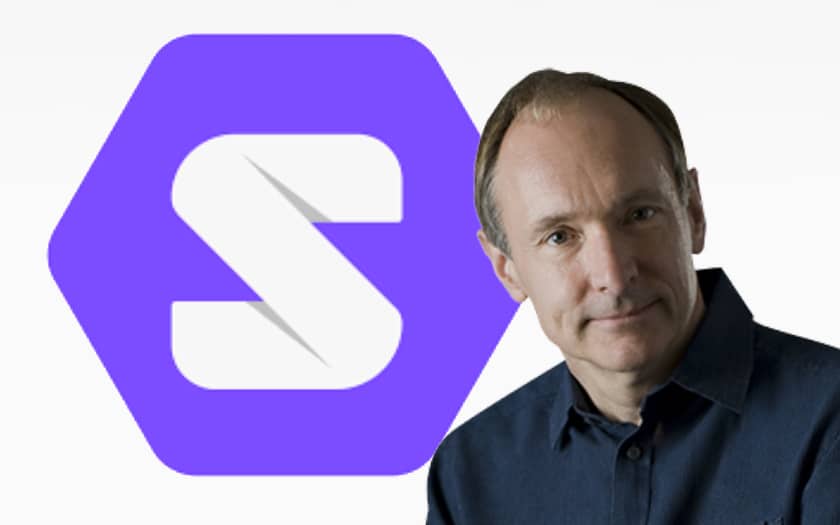While Mark Zuckerberg‘s metaverse ambitions dominate tech headlines, Sir Tim Berners-Lee, the inventor of the World Wide Web, is quietly charting a different course for the internet’s future from just a few meters away. Backed by the scientific and technological prowess of MIT, Berners-Lee is spearheading a “New Internet” concept built around his project Solid (Social Linked Data). Aiming to empower users with unprecedented control over their personal data.
Sir Tim Berners-Lee Challenges Zuckerberg’s Metaverse Hype with Vision for User-Centric ‘New Internet’
Berners-Lee, speaking in Lisbon, directly challenged the prevailing narrative surrounding Web3 and blockchain.
“Browsers defined Web 1.0. Apps defined Web 2.0. Data Wallets will drive a user-centric Web 3.0”.
He argues that blockchain protocols, while public, are often slow, expensive, and ill-suited for the private, fast, and secure storage of personal data.
To bring his vision to life, Berners-Lee co-founded Inrupt, a startup dedicated to developing tools based on Solid. The company has now announced a significant leap forward with the launch of its Inrupt Data Wallet. This innovative infrastructure includes a robust API (Application Programming Interface) for connecting applications. Also an open-source, white-label React Native implementation system.
Sir Tim Berners-Lee Charts Course for Next Internet, Offering Alternative to Big Tech’s Vision
The Inrupt Data Wallet effectively materializes Berners-Lee’s vision for a user-controlled internet. It taps into the burgeoning trend of mobile wallet usage. Major tech giants like Apple, Google, and Samsung are already making 17% of global personal purchases via mobile wallets. Are seeing 29% annual growth in their wallet services.
However, hundreds of different wallets fragment the current landscape. Suffering from interoperability issues. Limited capabilities, potential privacy and security risks.
Inrupt’s Data Wallet aims to become the universal data wallet, usable by any organization or developer across any platform or service.

The standardization of underlying protocols, data models, and interfaces, largely achieved through Solid’s Enterprise Solid Server (ESS) – a reference implementation developed at MIT – facilitates this ambitious goal. This new approach opens a new type of value exchange between individuals and organizations.
This allows any app to read and write data wherever it’s stored, fundamentally shifting data management from app-centric to people-centric. Berners-Lee explained the paradigm shift.
“Web 2.0 protocols ended up being defined by a few large companies that used our data to lock us into their platforms. The result was a big data race where the winner was the corporation that controlled more data, and the losers would be everyone else”.
Beyond the Metaverse: Sir Tim Berners-Lee’s Solid Poised to Reshape Digital Identity, Gains Traction with Major Players
While the metaverse garners significant attention, the foundational technologies for a user-centric “New Internet” are quietly gaining momentum. Sir Tim Berners-Lee, the architect of the World Wide Web, continues to champion his Solid (Social Linked Data) project. With his startup Inrupt making significant strides in empowering individuals with control over their digital lives. This vision, centered around the Personal Online Datastore (POD) and a universal API, is not only challenging existing tech paradigms. But also finding unexpected allies in established giants.
The core promise of Solid is to break free from the “app silos” that have historically trapped user data. “Thanks to Solid, information will no longer have to remain trapped inside app silos”, proclaims Berners-Lee’s vision.
In the new Web 3.0, applications can access and store data within a user’s POD via a universal API, allowing for seamless data utilization across multiple applications without compromising privacy or control.
Real-World Use Cases Showcase Solid’s Potential
The practical applications of this user-centric approach are already emerging. The BBC has launched a recommendation app where users grant access to their PODs. Sharing information they might otherwise keep private. In the climate tech sector, the Bezos Earth Fund and BlocPower are collaborating with Inrupt and Howard University to leverage Solid for generating more granular climate data. Also measuring household air quality.
On a governmental level, the Government of Flanders has distributed PODs to 6.5 million citizens. Enabling them to manage professional accreditations, resumes, and salary histories. While these are currently specific implementations and don’t yet guarantee widespread market adoption for Inrupt. They underscore the growing recognition of the underlying vision.

Mastercard’s Tokenization Strategy Echoes Solid’s Principles
Interestingly, even companies with seemingly opposing starting points are converging on similar principles. Mastercard, which once held the most blockchain patents globally and seemed to stand at the opposite end of Berners-Lee’s decentralized ethos, now adopts a strategy that mirrors Solid’s core value proposition.
Susana Rubio, Mastercard’s Vice President of Product and Solutions, explains their focus on e-commerce: “Users abandon the habit of storing their card details with dozens of merchants, as this leaves more doors open to hackers”.
Mastercard’s solution involves blockchain and tokenization, where they replace sensitive data like card numbers with unique digital tokens. This means that even if data is breached, the tokenization system leaves hackers with a string of unusable tokens, significantly enhancing security and privacy.
This strategic shift towards tokenization in e-commerce, aiming for 100% adoption, demonstrates a broader industry realization: user data security and control are paramount.
While the tech landscape has yet to widely adopt Inrupt’s technology, the underlying vision of empowering individuals with secure, portable digital identities is clearly resonating.

